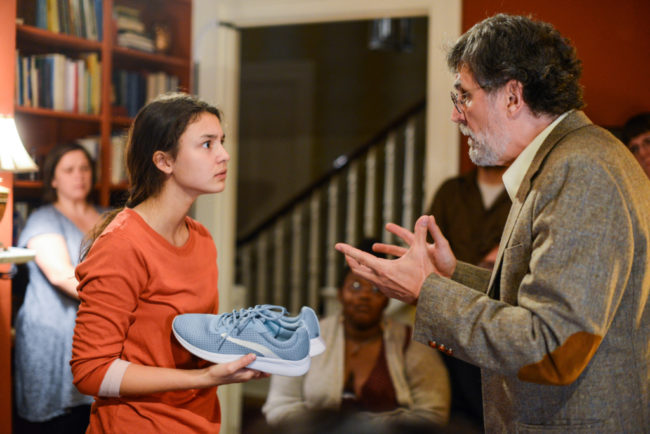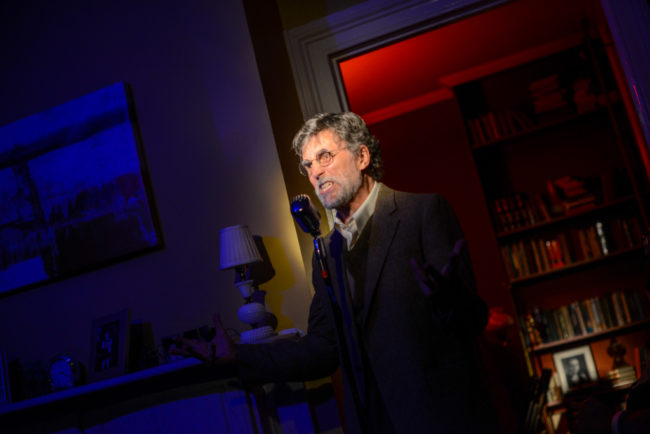Is the universe actually infinite? Or is infinite a generic designation we apply to whatever it is that we don’t understand? Ponderous thoughts, deeply vexing, and entirely not my own. They spring from the pen-eternal of playwright Rajiv Joseph in his work Mr. Wolf, now an immersive theatrical experience with Single Carrot Theatre. Directed by Genevieve de Mahy and Lauren Erica Jackson, Mr. Wolf is taking on an infinite life of its own inside The Rectory of St. John’s Church, also known as St. John’s in the Village, as STC settles into their 12th season in Charm City.

Mr. Wolf becomes more than just a show in the hands of directors Genevieve de Mahy and Lauren Erica Jackson; it becomes a theatrical experience. The duration of the program is approximately 90 minutes and while a bulk of the show’s action takes place in one room, audience members are moved from room to room throughout the experience, creating a unique sense of time, space, and place for the production. Audience members are invited into the world of the play— into the study that Theresa calls home, the support meeting room where Michael and Julie attempt to find solace but instead find each other, the childhood home of Theresa, and more— all spaced intimately in the rooms of The Rectory. Lighting and Sound Designer Christopher Rutherford (with co-designer Caelan Levine) enhances the experience with lighting unique to each of the rooms, setting a tone and mood for each scene. The aural complexities of the piece echo elements of Rajiv Joseph’s text; there is a recurring notion of “lots of noise” which Rutherford translates into subtle background sonic experiences so as to not overtake the experience with sound.
While the rooms themselves pre-exist the company’s utilization of the space, Scenic Designer Lisi Stoessel has layered imaginative craftiness into each of the play spaces. The chalk drawing of the heavens inside the study room is breathtaking; the meticulous detail on the punched-through chalkboard in the support meeting group is impressive. Stoessel presents an authenticity to the room designs, each unique and familiar yet unsettling in their strangeness at the same time. Costume Designer Heather C. Jackson makes it a point to keep the sartorial selection for the show subtle. It’s less about what they’re wearing and how these understated pieces gently accent the character’s personalities. This is particularly true for the Theresa character who is dressed in an almost non-descript top and jeans, much like the blank canvas that she’s been forced to become through her series of circumstances.
The story itself possesses this intrinsic element of mystery. Directors Genevieve de Mahy and Lauren Erica Jackson allow for this uneasy disconnect to flow readily between the rooms of the first three scenes. It isn’t until you’re halfway through the third scene that all of Rajiv Joseph’s pieces start to fit together in a semi-linear narrative experience. Jackson and de Mahy do an exemplary job of preserving the emotional integrity of the experience within each character separately as well as their emotional encounters with one another and how those encounters impact each other and the progression of the narrative on the whole. The pacing is sharp; de Mahy and Jackson ensure that the physical movement from room to room does not disconnect the action of the tale, nor does it create a great gaping gap to impede the overall momentum of the plot.

All roads spin around, point to, and end with Theresa (Zara Cojocaru.) Delivering an ineffable performance that is brilliant beyond words, Cojocaru is masterfully unique to this experience, crafting the character of Theresa almost as if she were an alien to our human world. (With an initial unfamiliarity of the text and her extreme reaction to the most simple of things— like a bar of chocolate— it is easy to mistake the character of Theresa for some sort of otherworldly being in the first scene!) Cojocaru is a radiant gem in the role; her ability to spitfire seemingly infinite questions when confronted with the opportunity to do so is both fascinating and vexing. Her character creation reads with almost savant level intelligence, with a distanced interest that one might associate with the Autism spectrum. Cojocaru delivers stunning moments of emotional tension and upheaval; her whispered confession on the rug in the finale scene is heartbreaking.
The intimacy of the unique staging situation allows for brilliant, whispered moments that can actually— to a degree— be whispered. This is best exemplified between Michael (Paul Diem) and Julie (Ama Brown) when they are whispering over the sleeping Theresa in the main lounge room. (This room is where the majority of the performance takes place, though it is not the initial starting point of the show.) Brown delivers a strikingly becalmed and yet versatile individual in the Julie character. The visceral blow of recognizing her role in life once Theresa has emerged into the “Michael & Julie” picture is harrowing. The jittering fury that funnels, albeit without voluminous crescendos of voice, out of Brown’s mouth when confronting the Theresa character about her particular circumstance is equally brutal. At first the connection between Cojocaru’s Theresa and Brown’s Julie seems special, almost endearing, though it quickly proves to be somewhat vexing and rather fraught with plight and peril.
Hana (Elizabeth Darby) arrives as an interloping figure in the mix of curious circumstances. It is easy to let judgement fall on Darby’s character’s decisions as they are presented to the audience in the skewed lens of Michael’s vantage point. Darby’s initial encounter with the Julie character is laced with irked malice that comes from a burning inferno of madness and unnamable feelings to complement the ludicrous situation in which she finds herself. The very telling scene that Darby exchanges with Paul Diem’s Michael in the doorway of the lounge (intimated to having taken place in the upstairs bedroom) is an unsettling moment that turns the stomach while tugging at the heartstrings; both players in this moment present irrational emotions that guide that scene through a flawless ugliness too beautiful for words.
Diem delivers an impressive performance as the distraught and almost distracted Michael character. There is a refreshing bliss in seeing a complex and dynamic emotional range delivered by Diem in a voice that never rises above casual conversational level. His most compelling emotional moments are delivered in hushed tones and whispers. Although the character does not deliver many textual lines— the scene with Julie in the support room excluded— Diem speaks volumes about the character’s anguish and feelings through simple gestures, varying postures, and subtly animated facial expressions. His presence on stage, particularly when passively engaging with the Theresa character is felt wholeheartedly; Diem augments Michael’s pains and makes them palpable for the audience.

Despite being the titular character, Mr. Wolf (Phil Gallagher) is experienced but briefly in the production. There is a maniacal ranting scene in the middle of the performance where Gallagher is given a microphone, reading aloud his preemptive suicide note (it is made very clear within moments of the play’s starting that Mr. Wolf kills himself), and the demagogue nature of Mr. Wolf is revealed in full force. There is a strange, shaky compassion with which he approaches his interactions with the Theresa character, which makes you question everything you learn about Mr. Wolf, once you learn it. Gallagher doubles up as the doctor and the detective, intentionally set down so as the Theresa character must see Mr. Wolf everywhere. It is the trying moments between Gallagher’s Mr. Wolf and Cojocaru’s Theresa that define the edginess of this production.
A remarkable theatrical experience, which leaves many things to digest in one’s mind and heart upon leaving the show, Mr. Wolf must not be missed this season. Follow Single Carrot Theatre up to The Rectory of St. John’s this autumn; you are in for infinite delights.
Running Time: Approximately 90 minutes with no intermission
Mr. Wolf plays through October 13, 2019 with Single Carrot Theater in The Rectory of St. John’s Church— 3009 Greenmount Avenue in Baltimore, MD. Seating is limited for this semi-immersive theatrical engagement and reservations are required. Ticket reservations can be procured online.
Single Carrot Theatre has posted a Content Transparency Notice for the show, which contains the following: “This show contains a gunshot, suicide and references to suicide, emotional abuse of a minor, and references to missing children.”

